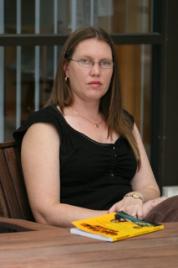Police experience can be 'merry-go-round' of stress - researcher
Published on 06 November, 2009
In Queensland, the public view of the police officer's image has long been contentious. Police were vilified and distrusted in the years prior to the Fitzgerald inquiry, with their standing improving greatly in the post-Joh years, aided particularly by ongoing positive public relations programs, such as 'Adopt a Cop', which saw schools around the State forming close ties with local officers.
The job is a very stressful one, as CQUniversity Senior Post-Doctoral Fellow - Preventative Health, Dr Karena Burke discovered, as she researched her doctoral thesis.

Dr Karena Burke
Karena said, "With Dad being an ambo (ambulance officer), I started asking myself why would someone take on one of these jobs and, like Dad, stay over 30 years."
Research for her Honours thesis showed clearly the differences between the 3 career paths, ambulance, police and fire fighters. Karena followed recruits' entry to the profession, and their first few operational years.
What did she find?
"I was intrigued to discover they really have 2 personas; if you're a victim of crime, then you want the police and they're supposed to help you, but if you've done something wrong, then the last person you want pulling up behind you is a cop in a cop car."
Dr Burke said, "It's fairly in your face, right from day one, it's not a role that creeps up on the person. As soon as an officer puts on that uniform and gets out there on the street, it hits them straight between the eyes."
There's no doubt, it's a stressful occupation and even though there's been research on recognising the different types of stresses in policing, the organisation is one that is very stuck, in terms of organisational culture, and, " ... there's not a lot of change going on that isn't really hard-fought".
How is stress handled at the personal level?
Dr Burke said, "Alcohol plays a big part, because it's not necessarily seen as a negative thing by the officers. It's about going out, dealing with the job that's been difficult, but knowing that you can come back into the station and it's a safe environment; you can say and do what you need to, whilst sharing a beer."
The therapeutic side of that is balanced by the darker aspects of overuse of alcohol. Additionally, over time, Dr Burke said, officers won't talk to partners, or people outside the profession, because they don't understand the difficulty of the role. "They see some awful things!"
Dr Burke said that the more the stresses of the job are shared in-house, the more the police culture that is so often criticised, is reinforced.
"It's really good that they have that social network within the force ... but it does become very insular and the officer doesn't use the social support networks they had in place before they entered the service. Some friendships will drop off, and problems with partners develop."
The divorce rate amongst recruits Dr Burke followed for 2 years, was 20 percent.
In many cases officers then form relationships with other officers, and there's a ‘merry-go-round' effect established to the extent that, as Dr Burke said, "It's just a perpetuating cycle of, ‘Well this is how I'm going to cope with this' ... and it all keeps coming full circle."
The work has been published in a book titled, Traumatic Stress in Police Officers: A Career-length Assessment from Recruitment to Retirement and is published by Charles C. Thomas.

